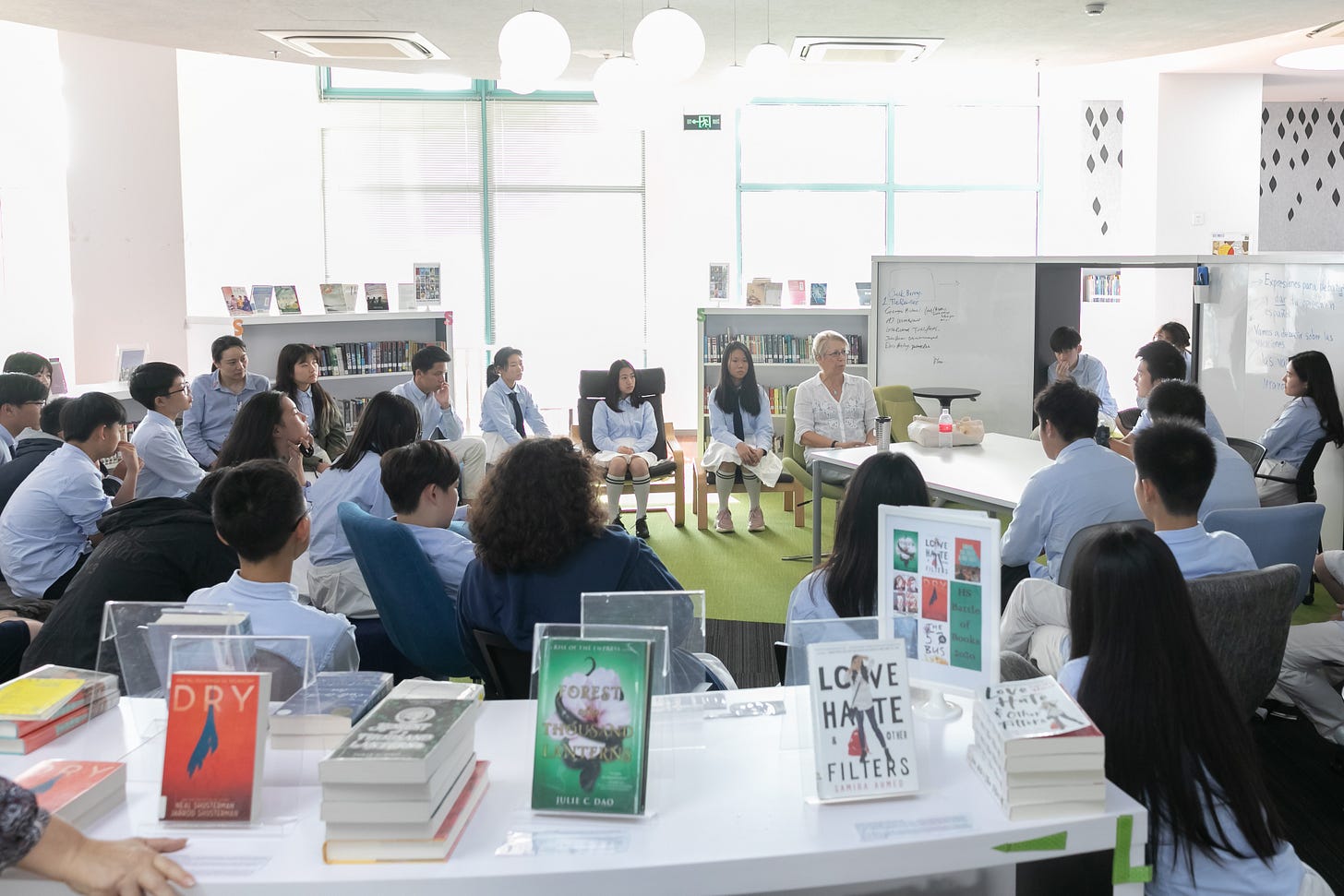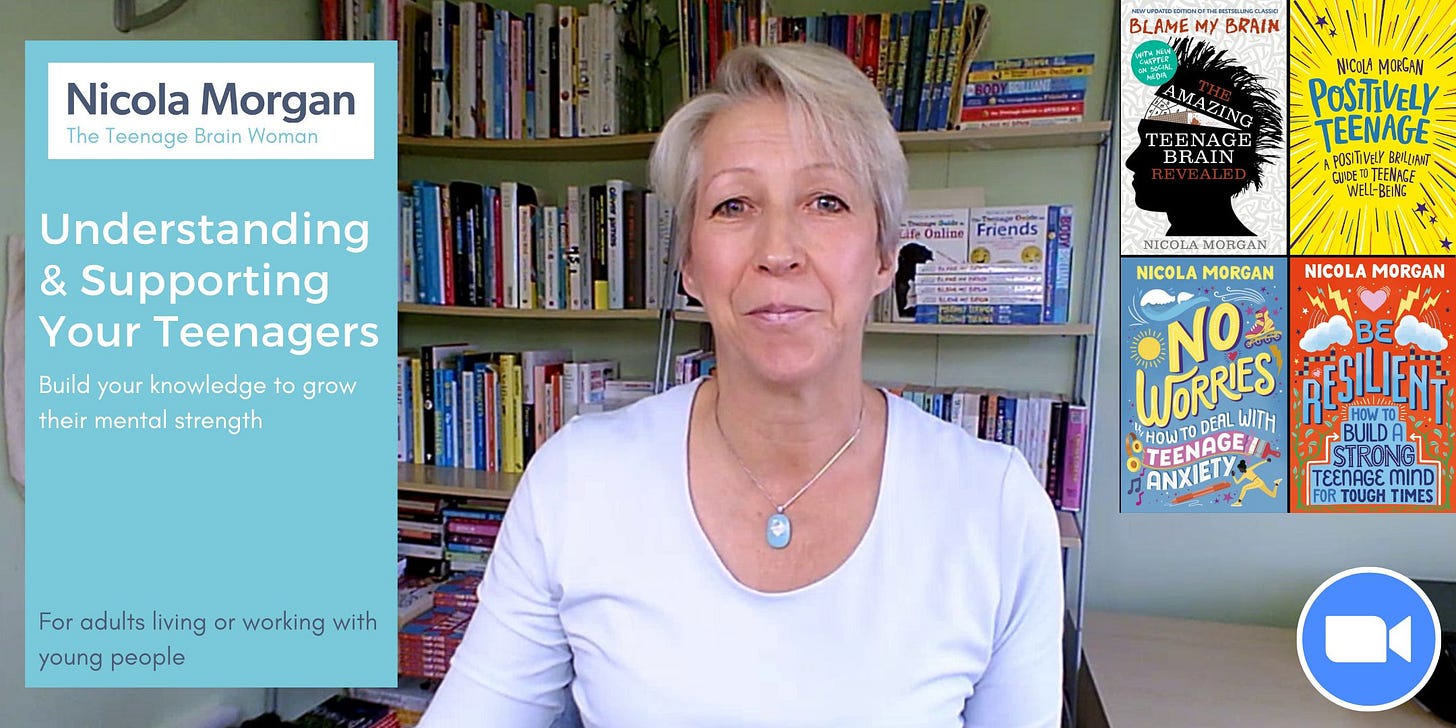(An in-person Q&A in Shanghai, 2019)
One of the most satisfyingly simple parts of my work is doing an online Q&A session with a school. My prep just involves discussing with the organisers how we can make it work best and what they would like to focus on; staff give students an opportunity beforehand to discuss their questions so they can pick the ones they all like best; and then, at the appointed time, we switch on our computers and before we know it the hour has vanished and everyone is buzzing with new ideas and feeling a lot happier. And because it’s so much less preparation and energy for me, it’s cheaper for schools. Win, win!
This time, with the school’s agreement, I thought I’d put the questions here and answer them again - more succinctly… And with useful links.
This session was with the Year 11 students of Kings Monkton School in Cardiff. Huge thanks to the staff who put this together and the students who fully engaged with the process and asked great questions. And I know they looked at my website in detail because there was another question about why I went to a boys’ school. (I’m not answering that here! You’ll need to book me…!)
Would your school like to do this? On any of my topics. See here for details.
Q: What’s the best way to write a revision timetable?
Here’s a post I wrote about that some years ago. It still stands up.
Here’s a template you could use, with some instructions:
Here are some tips:
Paper or digital? It’s up to you. But if you make a paper one, be prepared to change it often.
Be prepared to change it often! Life gets in the way; some things take longer or less long than you planned. Be adaptable.
Ask for help if planning isn’t your strong point.
If you haven’t started it yet, start it now.
Don’t feel you have to do it the same way as someone else - it’s yours.
(I also digressed and talked about the “getting things done” method of planning that I use. This avoids making lists, which can often be overwhelming, and instead gets you to write the task in a calendar/diary space, so you know when to do it. This stops you worrying about how much you have to do. The staff were apparently very fascinated by this!)
Q: Is it good to revise with music on?
If you find it helpful, YES! (If not, no…) One of the reasons why it can be a good idea is that is helps you block out annoying things, such as noise or mental distractions. Read this for the full explanation (show your parents!): Can you work well listening to music? The truth.
But bear these things in mind:
The music needs to be: familiar, not new; played at a background volume, not too loud; music you like.
Make a playlist in advance so you don’t have to keep stopping to choose another track.
Be self-aware: choose music that you find you can work with and if you can’t, stop.
Remember that, when you’re in an exam, you’re not going to be able to listen to music so don’t come to rely on it.
Q: What are the benefits of revising with friends?
Before I say what the benefits can be, some points of caution:
It doesn’t suit everyone so you don’t have to if it doesn’t suit you.
Try to revise with friends who are either at the same level as you or who will be genuinely supportive if you’re struggling - avoid friends who will make you feel stressed.
The benefits:
You can keep each other focusing - you can make rules about how long you focus for and you can stop each other getting distracted
You can test each other - so, you could say you’re going to work on a topic for 45 minutes and then test each other
Asking questions and hearing and reading the answers helps you learn in a “multi-sensory” way, rather than simply reading or simply listening
Explaining something to someone else is one of the best ways to understand it better yourself
Q: When should you start revising?
You already have! From the moment you first learnt something or first covered a topic, your brain has been trying to embed it. Now you need to do this deliberately - that’s revising as you know it and you can start now! The more times you tackle something, the better you’ll know it. So, if you think you haven’t started, start now - or as soon as you’ve made your time-table.
Do you know about spaced learning? This is the well-proven theory that spreading out your learning is better than doing it all in one go. So, each topic and each set of material needs to be covered several times before your exams.
Q: What’s the best routine to follow the night before an exam?
I suggest:
After your dinner, get the things ready to take tomorrow: your stationery, snack, anything else you need. Check everything and put it somewhere safe.
Have a quick last read through of your final notes, then put them away.
Write any worries on a piece of paper and then put that away, totally out of sight. You don’t need to think about that now.
Start your bedtime winding-down routine (see my resources on sleep) but add in something extra nice: maybe a bath, a hand or foot massage, a cup of cocoa, anything that makes you feel happy and relaxed. Sign off your phone/devices/social media and say good night at least an hour before you turn your light off..
Once in bed, read for pleasure or write your journal or just listen to calming music. Then sleep! (But don’t worry if you can’t.)
Q: What is the optimum time to revise?
Everyone’s different on this. Some people (often called “larks”) are more alert in the morning; others (often called “owls”) seem to work better in the evening. Find what works for you.
But bear in mind these guidelines:
It is not a good idea to revise late at night, in the 1-2 hours before you want to fall asleep. This will wake your mind up, and the fact that you’re tired won’t make you sleep better but will make you learn les well.
Make sure you take breaks - in the break you should ideally get a bit of physical activity and some food and water.
Q: What snacks are best for brain power?
There’s no magic food and even when something is known to be a really nutritious food that doesn’t mean that eating a lot of it will make a noticeable difference to how your brain works. Try to get a balance and a variety. Having said that, the following things should definitely be a major part of your diet and any of them make good ingredients for snacks or sandwiches to keep your brain fuelled:
Nuts (including nut butters) and seeds; fruit, especially berries such as blueberries, cranberries, cherries, strawberries; eggs; yogurt; things made with oats and whole grains; avocados; oily fish such as mackerel, tinned tuna and salmon.
Here’s a useful sheet I made with lots of practical ideas:
And here are two recipes that make BRILLIANT healthy snacks:
Q: Is it too late to start revising now?
No! Get started!
All my exam advice
See here for all my best exam advice all in one place. The article is pitched at parents and other adults but there is a lot that is directly created for exam students themselves. Read it, enjoy it and feel empowered. You can do this!
Parents/carers and teachers/other professionals, have you booked your place on my webinar, Understanding and Supporting Your Teenagers? Hurry! A lot of schools are promoting this to their parent cohort so it could suddenly sell out.
If you can’t make the date, book your place and I will send you the recording. Just ask.






